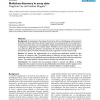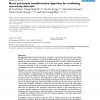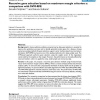78 search results - page 13 / 16 » Identifying Gene Signatures from Cancer Progression Data Usi... |
BMCBI
2006
13 years 7 months ago
2006
Background: Non-negative matrix factorisation (NMF), a machine learning algorithm, has been applied to the analysis of microarray data. A key feature of NMF is the ability to iden...
BMCBI
2004
13 years 7 months ago
2004
Background: A routine goal in the analysis of microarray data is to identify genes with expression levels that correlate with known classes of experiments. In a growing number of ...
BMCBI
2007
13 years 7 months ago
2007
Background: With microarray technology, variability in experimental environments such as RNA sources, microarray production, or the use of different platforms, can cause bias. Suc...
BMCBI
2006
13 years 7 months ago
2006
Background: In class prediction problems using microarray data, gene selection is essential to improve the prediction accuracy and to identify potential marker genes for a disease...
BMCBI
2007
13 years 7 months ago
2007
Background: The p53 gene family consists of the three genes p53, p63 and p73, which have polyhedral non-overlapping functions in pivotal cellular processes such as DNA synthesis a...



